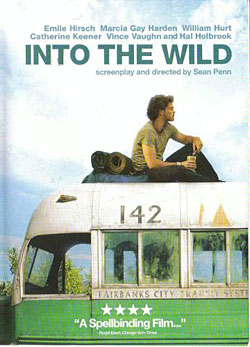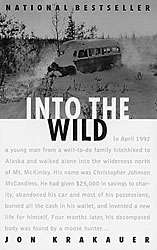 I finally watched Into the Wild this past weekend. Despite the rave reviews, I had been avoiding the film, not wanting to get sucked into arguments about whether Christopher McCandless was an inspiring idealist for turning his back on civilization or an ill-prepared idiot who at least should have brought a map and proper footwear for his odyssey into the Alaskan backcountry.
I finally watched Into the Wild this past weekend. Despite the rave reviews, I had been avoiding the film, not wanting to get sucked into arguments about whether Christopher McCandless was an inspiring idealist for turning his back on civilization or an ill-prepared idiot who at least should have brought a map and proper footwear for his odyssey into the Alaskan backcountry.
After reading Jon Krakauer’s book back in the summer of 1997 I fell squarely in the latter camp. I had just graduated from college, was the same age McCandless had been, loved the outdoors, desired to go to Alaska myself (I would a year later). I should have been the perfect audience for Into the Wild, but while I found the book itself interesting, I had little empathy for the subject and what I thought were a few too many foolish decisions.
I was interested in his story, but I was not inspired.
So, despite the publicity, I avoided the film version for months. I didn’t want to watch poor preparation be romantically glorified. When I finally decided to watch the movie, I was surprised to discover how much I enjoyed it. Much of the credit goes to actor Emile Hirsch, director Sean Penn, the gorgeous locations, and an engaging narrative.
A decade later, I find myself far less judgmental of Christopher McCandless/Alexander Supertramp. His flaws are still there, albeit romantically, in the film. And he makes choices—many choices—I never would (donating money I understand, burning it I don’t). We are very different people, driven by different motivations to walk into the wild.
 But, I’ve learned, by listening to the range of voices and experiences here on Trailspace, that there is usually more than one right way to approach the outdoors, and it’s not always the way I might choose. If you’re not hurting me, anyone else, or nature, I’ll try to listen first and let our differences go.
But, I’ve learned, by listening to the range of voices and experiences here on Trailspace, that there is usually more than one right way to approach the outdoors, and it’s not always the way I might choose. If you’re not hurting me, anyone else, or nature, I’ll try to listen first and let our differences go.
That doesn’t mean we must turn a blind eye to tragedy. Learning from others’ mistakes is a good thing. Judging people by their mistakes and speculation can be problematic though. It gives one a false impression of superiority, which can be dangerous.
Yes, McCandless could have used some caution and moderation (and a map, among other things). But, I’ll refrain from entering the idealistic-versus-foolish debate. Nothing’s ever that simple. And in reality McCandless probably fell somewhere in the human middle.
I’m now going to reread Krakauer’s original.

 by Alicia MacLeay
by Alicia MacLeay









